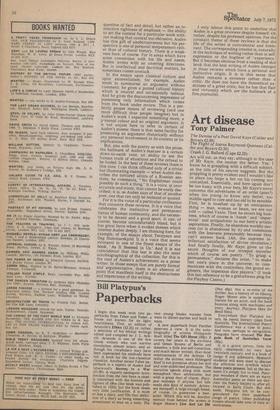Bill Platypus's
Paperbacks
I begin, this week with two paperbacks from Faber and Faber, a house not known for its lightheartedness. First, an edition of Aristotle's Ethics (E2.25) or, rather, a selection of his ethical writings edited and compiled by J. L. Ackrill. Aristotle is one of the few Greek writers who can survive translation almost intact, and although his vocabulary may have been superseded his methods have not. A book for the non-classicist classicist. Another recent Faber paperback is a reprint of Auden and Isherwood's Journey to a War (£1.50). A vaguely apologetic introduction from the two boys is chiefly concerned with the horrors and rigours of One (the book was published in 1939), but the book needs very little justification. It is more or less a diary, and fills that definition of a diary as being something sensational to read on a train. The
two young blades wander from wars to dinner-parties and back to
Wars.
A new paperback from Panther deserves a view. It is the autobiography of actress Hildegarde Knef, titled The Gift Horse (50p), It covers her years in the environs and Green Rooms of Berlin and America: a little less self-conscious, and much better written, than most reminiscences of the Actress. Or rather the actress, since Hildegard Knef is not pompous about her dull and over-publicised profession. The narrative speeds along with more metaphors than adventures, but with a great deal of charm. Platypus wonders if anyone but him reads this kind of memoir. Actresses manque? A large enough breed, of course, to guarantee a bestseller. Which this will be. Another memoir from behind the screen is Roger Moore's Uve And Let Die
(Pan 40p). Not a re-write of the thriller, but a history of its filming. Roger Moore also is surprisingly literate for an actor, and the book bounces along with machismo and irony. Anyway, Platypus likes the Bond films.
Everywhere that Platypus travels, he meets literary types from Australia. The International Poetry Conference was a case in point. And now, perhaps in recognition, Penguins have reissued The Penguin Book of Australian Verse (60P).
It is a grand survey, from the early nineteenth to very late twentieth century, and is a book of range if not substance. Research ; students will soon start to discuss the affinities and symbols which these poets possess, but at the moment it's simply fun to read. Platypus wonders if there are as many Australian poets as there are dentists: the Poetry Society is, after all, located in Earls Court. But this aside, Penguins are to be congratulated for their paperback .range of poetry. Other publishing houses should take note of their inventiveness.












































 Previous page
Previous page